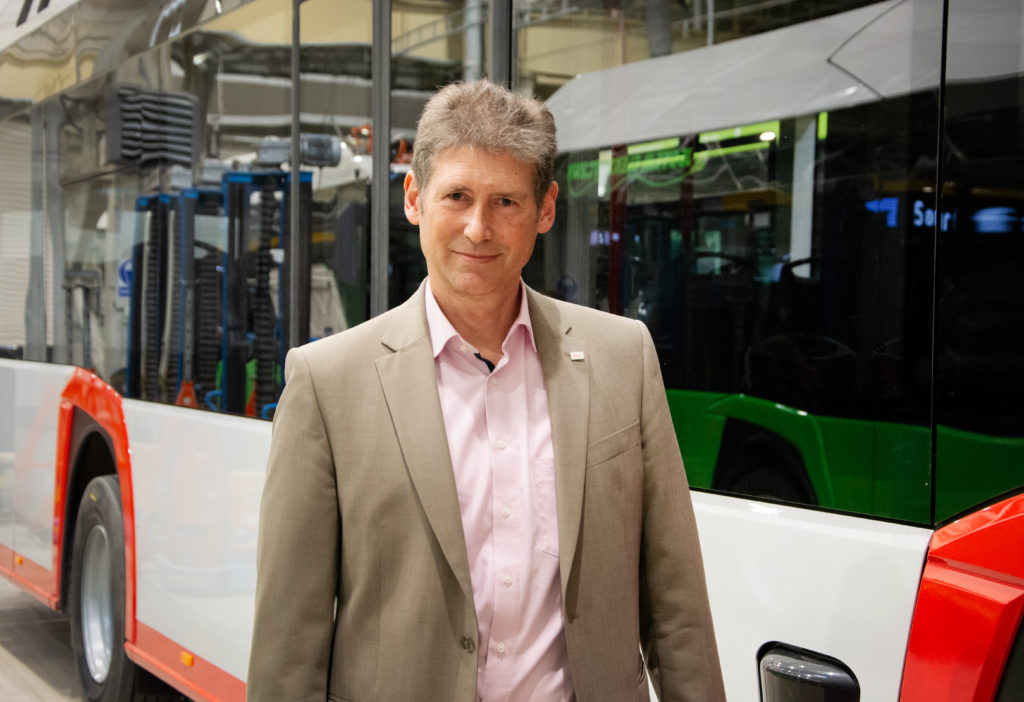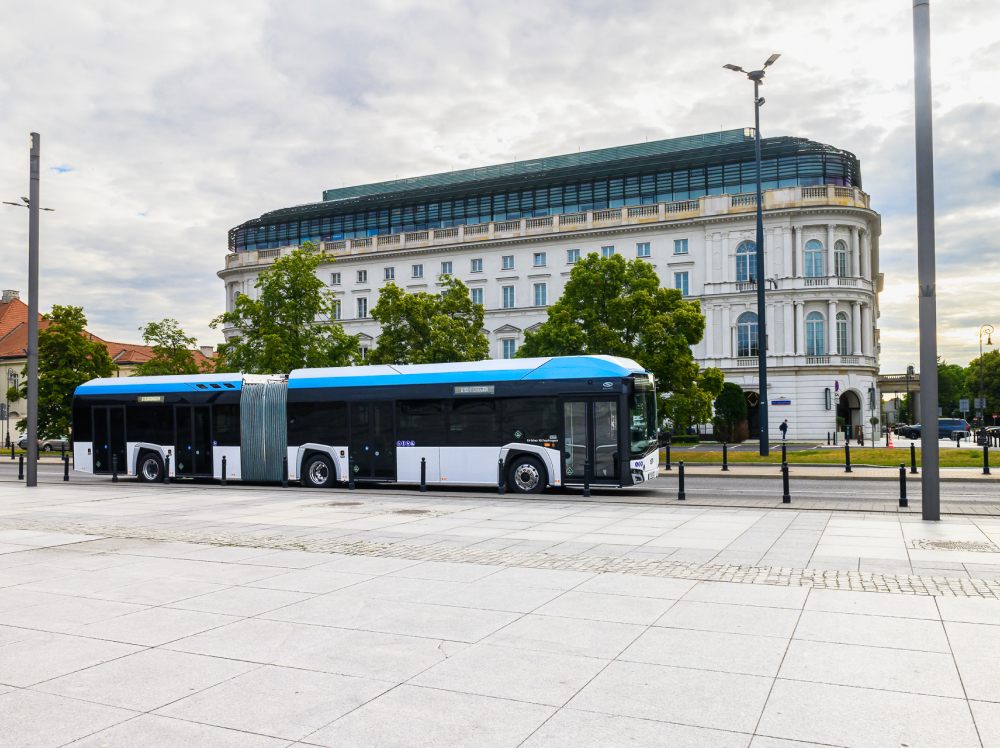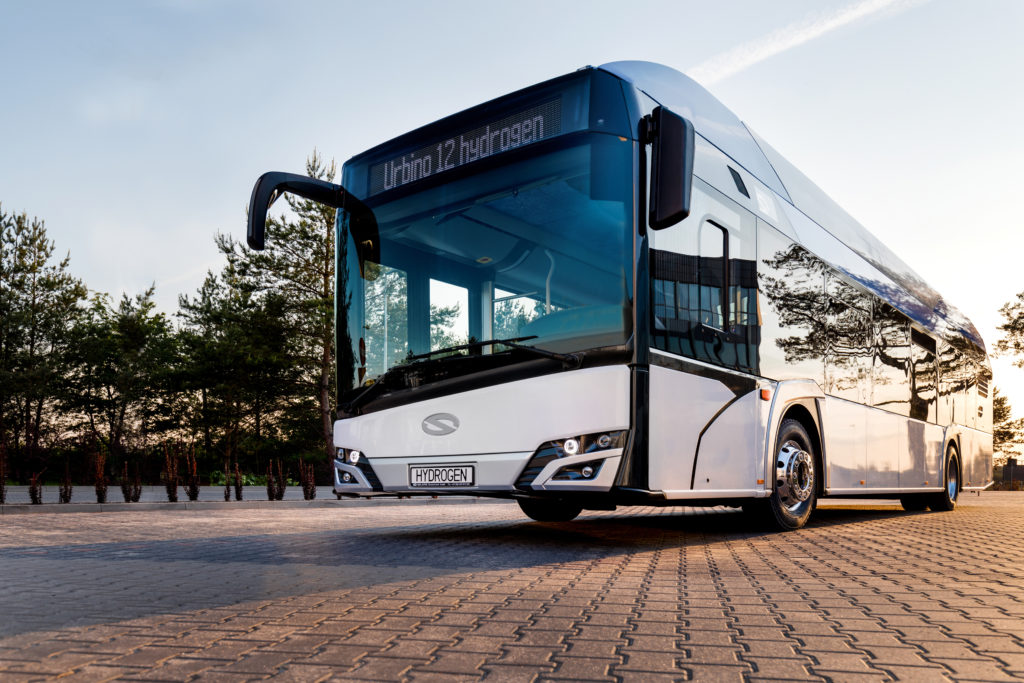DUISBURG
COMMITS
TO THE FUTURE
SOLARIS HYDROGEN BUSES WILL BE PART OF THE HYDROGEN REVOLUTION IN THE REGION
The first hydrogen buses will roll out onto the streets of the city of Duisburg by the end of this year. The local public transport operator Duisburger Verkehrsgesellschaft AG (DVG) has ordered a total of 25 Solaris buses fitted with hydrogen fuel cells. This is a considerable investment in sustainable local public transport. The goal of DVG is ambitious – by 2030 the city’s entire diesel bus fleet should consist solely of zero-emission vehicles.
Duisburg is a city that has been committed to environmentally-friendly public transport solutions for a long time now. This commitment is driven by the desire to innovate urban transport locally, but is also an important contribution to comply with the provisions of the Clean Vehicles Directive. The city has therefore decided to replace its entire fleet of combustion-engine buses with hydrogen vehicles by 2030. Harald Boog, Head of Vehicle Management at DVG, talks about key aspects of its collaboration with Solaris as well as about the region’s hydrogen plans.
CHOICE OF TECHNOLOGY
Each city confronted with the challenge of the green transformation must, sooner or later, take a decision regarding the choice of zero-emission technology it wishes to invest in. The answer to the question of which solution will work best is very individual and depends on a variety of factors and circumstances, including available infrastructure, the characteristics of individual bus routes and the available energy resources. In the case of Duisburg, the choice turned out to be clear.
“The range and flexibility of operation made hydrogen buses the most favourable option.“
Harald Boog, Head of Vehicle Management at DVG
This conclusion is based on thorough comparative research which greatly facilitated the decision-making process. Commissioned by DVG, the research covered different types of vehicles, including battery-powered and diesel units, the latter being considered only for their comparative value. Numerous calculations regarding local conditions showed that it was hydrogen buses that lived up to the expectations of the city both in operational and economic terms.

Harald Boog, Head of Vehicle Management at DVG, during a visit to the Solaris factory.
THE GERMAN MARKET INVESTS IN HYDROGEN
The purchase of Solaris hydrogen buses perfectly fits not only into the strategy of the region, but also into German’s whole transition to environmentally-friendly transport.
“Duisburg is one of five German cities designated as hydrogen competence centres. What is more, Duisburg boasts the largest inland port in Europe and well-developed industrial infrastructure, which makes hydrogen supplies particularly viable”
states Boog.
The city has also started a “Hydrogen Training Centre” project, which is a state-funded scheme to support the phasing out of coal.
INFRASTRUCTURE
DVG plans to build a hydrogen refuelling station.
“For the time being, there will only be one stationary refuelling station at the DVG depot, which can cover the entire demand for Hydrogen. However, we are still considering a pipeline and/or electrolyser”
explains Harald Boog.

Solaris Urbino 18 hydrogen.
VEHICLES ORDERED
The carrier DVG has ordered a total of 25 hydrogen buses made by Solaris. 11 of them are 12-metre vehicles, the remaining ones are 18-metre articulated buses.
“By ordering the first 25 hydrogen buses, we are taking another important step towards making public transport in Duisburg completely emission-free and sustainable”
said DVG CEO Marcus Wittig during the contract signing.
The Urbino 12 hydrogen and Urbino 18 hydrogen vehicles that will roll onto the streets of Duisburg in a few months’ time are quiet and emission-free vehicles powered by fuel cells of 70 kW and 100 kW respectively. The drive units in the Solaris hydrogen vehicles are electric traction motors producing 160 kW (in the 12-metre units) and 240 kW (in the articulated buses). Besides that, the ordered vehicles will feature Solaris High Power batteries acting as an additional electric power storage facility. In hydrogen buses, electric power is generated through reverse electrolysis and then transferred directly to the driveline. Hence, the vehicles are environmentally friendly and do not release any noxious exhaust fumes into the atmosphere.
The comfort and safety of travellers will be ensured by efficient air-conditioning with a heat pump, a video surveillance system and a modern passenger information system. Comprehensive ADAS systems, including ones that detect pedestrians and cyclists in the blind spot of the vehicle and alert the driver using visual and auditory signals, will aid the driver. Day-to-day operation will be supported by eSConnect, the bus fleet monitoring and management system designed by Solaris.
“The buses will operate on all routes within our bus route network in Duisburg”
declares Boog.

Solaris Urbino 12 hydrogen.
COLLABORATION WITH SOLARIS
Solaris’ position on the German market is strong. Many operators point to the Solaris brand as a reliable partner for bus supply. Customer satisfaction in the German market is regularly measured and reported in detail in regular Customer Satisfaction Surveys.
“Having previously identified Solaris as a reliable partner in bus supply, we expect a product from Solaris that provides a high level of reliability and availability with short response time and good technical support as crucial elements”
said Boog.
Thanks to the ambitious plans we can expect the city of Duisburg to become a leader in environmentally-friendly public transport and thus be a role model for other towns and cities in Germany and Europe.







